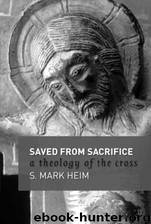Saved from Sacrifice: A Theology of the Cross by Mark S. Heim

Author:Mark S. Heim
Language: eng
Format: mobi
Published: 2009-05-16T13:38:00+00:00
That the early Christian imagination should seize upon this prophet's story in correlation with the work of the Savior tells us a great deal. God takes a scapegoating incident and uses it quite against the expectations of those who carry it out, in the service of a wider mission of grace and averted punishment. The mission of Jonah to a nation outside Israel would of course be a striking point for Gentile Christians. But the central dynamics of the story itself - the sacrificial scenario that casts Jonah into the sea and the nonsacrificial way God deals with the Ninevites - must have struck Christians as integrally connected with the work of Christ. Of course, they had good authority for this, since in Luke and Matthew when Jesus is asked for a sign, he answers that no sign will be given to them but the sign ofJonah. As Jonah was three days in the belly of the sea monster, so the Son of Man will be three days in the heart of the earth. And the people of Nineveh will rise up at the judgment to condemn this generation, as they repented at the preaching of Jonah, and "something greater than Jonah is here" (Matt. 12:41).
Christ and the Vindication of Susanna
The type of Susanna is even more fascinating. Before turning to the panels on the casket that depict her, we will briefly review her story. Susanna is a beautiful Jewish woman highly trained in the law and married to a prominent leader in the Jewish community of Babylon. Two elders in that community are consumed with lust for her and hide in the garden of her house when she comes to bathe there. When she is alone, they demand that she have sexual relations with them. If she doesn't, they will raise an alarm and claim that they have caught her in adultery. Susanna resists them and cries out for help: "I choose not to do it; I will fall into your hands, rather than sin in the sight of the Lord" (Sus. 23).
She is then brought to court, and the two elders offer their false testimony against her. She is convicted and led away for the collective execution. Susanna cries out, "0 eternal God, you know what is secret and are aware of all things before they come to be; you know that these men have given false evidence against me. And now I am to die, though I have done none of the wicked things that they have charged against me!" (vv. 42-43).
The text says God heard her cry, and "God stirred up the holy spirit of a young lad named Daniel, and he shouted with a loud voice, `I want no part in shedding this woman's blood!"' (vv. 45-46). Daniel then interrogates the two elders separately and exposes their lie (since they cannot agree on which kind of tree they caught Susanna and her supposed lover under), resulting in Susanna's vindication, a judgment against the elders, and the text's conclusion: "Thus innocent blood was spared that day.
Download
This site does not store any files on its server. We only index and link to content provided by other sites. Please contact the content providers to delete copyright contents if any and email us, we'll remove relevant links or contents immediately.
The Secret Power of Speaking God's Word by Joyce Meyer(3182)
Signature in the Cell: DNA and the Evidence for Intelligent Design by Stephen C. Meyer(3132)
Real Sex by Lauren F. Winner(3014)
The Holy Spirit by Billy Graham(2944)
The Gnostic Gospels by Pagels Elaine(2527)
Jesus by Paul Johnson(2352)
Devil, The by Almond Philip C(2325)
23:27 by H. L. Roberts(2248)
The Nativity by Geza Vermes(2227)
Chosen by God by R. C. Sproul(2161)
All Things New by John Eldredge(2160)
Angels of God: The Bible, the Church and the Heavenly Hosts by Mike Aquilina(1958)
The Return of the Gods by Erich von Daniken(1943)
Angels by Billy Graham(1922)
Knowing God by J.I. Packer(1854)
Jesus of Nazareth by Joseph Ratzinger(1811)
The Gnostic Gospel of St. Thomas by Tau Malachi(1794)
Evidence of the Afterlife by Jeffrey Long(1786)
How To Be Born Again by Billy Graham(1778)
